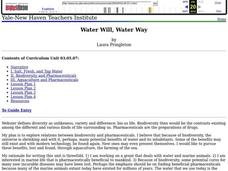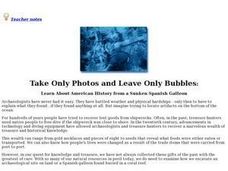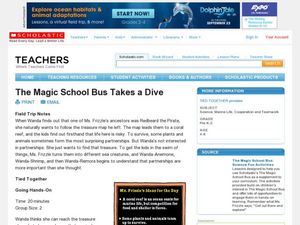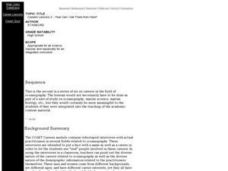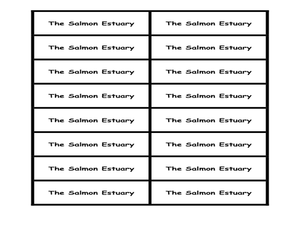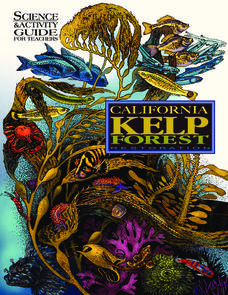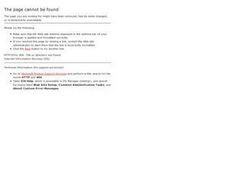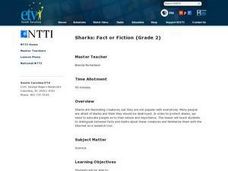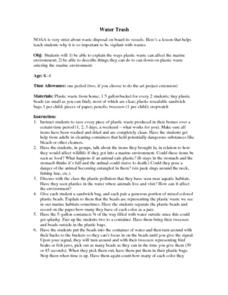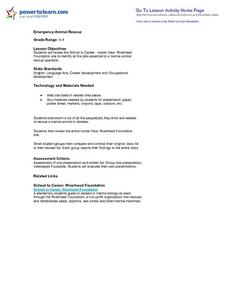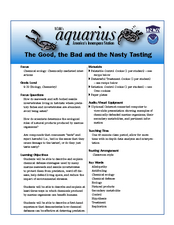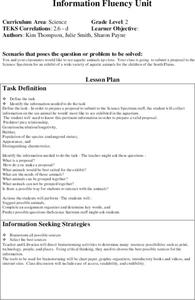Curated OER
Water Will, Water Way
Students test tap water for hardness and mineral content. In this environmental science lesson plan, students identify the different stages of the water cycle. They classify plant and animals according to the rules of taxonomy.
Curated OER
Take Only Photos and Leave Only Bubbles: Learn About American History from a Sunken Spanish Galleon
Students simulate the research process of investigating a shipwreck. In small groups, they conduct Internet research, and develop and write a proposal for excavation of the archaeological site.
Curated OER
Introduction to Coral Reefs
Students identify locations of coral reefs, both in the water and around the globe, identify relative depth of corals in the ocean by observing behavior of cold and warm saltwater, and create models of coral reefs.
Curated OER
Something Fishy Going On
Learners create a video animation of how Swimmy gathered his fish friends together to form a great big fish that would frighten the predator tuna away. In art class each child create a small red fish which gets displayed in the ocean...
Curated OER
Ocean Habitats
Students examine the water samples from a demonstration and discuss the difference between fresh and salt water. They draw different animals that live near or in the ocean and how humans can harm the ocean habitat. They draw pictures of...
Curated OER
The Magic School Bus Takes a Dive
Learners learn along with Ms. Frizzle's class. In this Magic School Bus lesson plan, students find out how partners can help run a race just as Wanda learns that survival on the coral reef often depends on cooperation.
Curated OER
Careers Lessons 2 - How Can I Get There from Here?
Students identify differences between jobs and careers, and identify career areas within the broad field of oceanography. They research, compare and contrast requirements needed to become a practitioner of various oceanographic career...
Curated OER
investigating and Modeling Sea Urchin Fertilization and Development
Students begin by using clay to model fertilization and early development of sea urchins and chordates. They move on to mixing live sea urchin sperm and ova together to observe, diagram and record events occurring in fertilization and...
Curated OER
Beach Cleanup at a Local Beach
Students participate in an environmental clean-up activity. In this environmental lesson, students travel to a local beach. Working in small teams, students collect trash from the local beach. Returning to school, students sort the trash...
Curated OER
The Salmon Estuary And Human Impacts
Students have discussions and complete activities about the pacific salmon life cycle and marine parasites. In this salmon lesson plan, students complete activities such as observing sea lice, playing a tag game, and a board game.
Curated OER
From the Gulf of Mexico to the Moons of Jupiter
High schoolers compare deep ocean conditions to those found on the moons of Jupiter. In this Earth science instructional activity, students consider the possibilities and conditions needed to support simple life. High schoolers examine...
Dawn N . Ericson
California Kelp Forest Restoration
This unit is so cool, you won't be able to "kelp" yourself! Intended for all grades, this science and activity guide for teachers offers a unique opportunity to understand kelp's role as a valuable ecological resource. Teachers and...
Curated OER
Let's Learn about Fish
Students explore fish. In this aquatic life science lesson, students complete a KWL chart about fish, listen to What's it Like to be a Fish?, and observe a classroom aquarium or take a trip to a local aquarium. Students complete an...
Curated OER
Sound for Sight
Students study echolocation and understand how dolphins use it to locate prey, escape predators, and navigate their environment. They view a video, "In the Wild-Dolphins with Robin Williams" and see first hand how dolphins communicate. ...
Curated OER
Start at the Very Beginning
Students explore ocean ecosystems. In this cross curriculum art and oceans lesson, students create a collage featuring three-finger algae using sand paper, tissue paper, and construction paper.
Curated OER
Under the Sea Webquest
Fourth graders work in small groups to research a selected species of ocean creature. They conduct Internet research, complete a WebQuest and worksheet, and complete a group oral presentation that includes an illustration of the food...
Curated OER
Sharks: Fact or Fiction
Second graders discover the truth about sharks. In this shark lesson, 2nd graders use different resources to help distinguish between fact and fiction with what they have heard about sharks. They complete an attached activity sheet.
Curated OER
Aquatic Life
Sixth graders work in pairs to research information related to aquatic life using references from the World Wide Web. They present their findings in the form of an oral presentation to the class.
Curated OER
Create an Underwater Scene
Students apply knowledge of underwater ocean life by creating an ocean life scene with marine animals and plants placed at appropriate ocean depths.
Curated OER
Water Trash
Learners explain the ways plastic waste can affect the marine environment. They are able to describe things they can do to can down on plastic waste entering the marine environment.
Curated OER
Emergency-Animal Rescue
Students brainstorm list of people and jobs they think are needed to rescue distressed marine animal, review entire Inside View: Riverhead Foundation site, create revised list, compare and contrast original class list to revised list,...
Curated OER
Harmful Algal Blooms in Full Bloom
Students calculate the total percentage of samples from the data on the graphs. In this marine science lesson plan, students analyze the concentration levels over a period of time. They suggest ways to lessen the effect of these blooms.
Curated OER
The Good, the Bad and the Nasty Tasting
Students examine the effect of chemicals from marine plants or animals on predator's preferences. In this ecology lesson, students conduct taste tests and collect necessary data. They write their conclusion after analyzing experimental...
Curated OER
Information Fluency Unit
Second graders create a proposal for the Science Spectrum to have an exhibit of a wide variety of aquatic animals for the children of the South Plains. These students would like to see aquatic animals up close.


